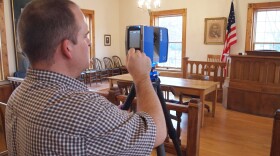Unlike other rural towns in central Illinois, officials in Beardstown say their population is growing. And they want to make sure everyone is counted in the 2020 census.
For this week’s Illinois Issues, we look at the challenges to an accurate count and what’s at risk if not everyone participates.
Rafael Trujillo has run a grocery store in Beardstown -- just east of the Illinois River -- for more than 20 years. He sells nopales (cactus) and tortillas, and other foods from his native Mexico.
Now, immigrants from different countries are moving there to work at the pork processing plant, JBS USA, and he’s had to include different food in his inventory, like yuca, he said.

“Five years ago, most people were coming from Mexico, Guatemala and El Salvador,” he said. After the pork processing plant changed owners, from Cargill to JBS, in 2015, more workers from the Dominican Republic and some West African countries are arriving.
Unlike other rural towns in central Illinois, town officials in Beardstown say their population is growing. And they want to make sure everyone is counted in the 2020 census.
“I do believe there is growth in our community," said Beardstown Mayor Leslie Harris. "We have 21 languages spoken in our schools. That tells me that there’s more people.”
Hard To Count
Estimates from the American Community Survey suggest the population is shrinking. The 2010 census counted 6,123 residents, and the 2018 population estimate is around 5,502. The community survey is a long-form, ongoing questionnaire of the population done by the U.S. Census Bureau and based on decennial census numbers.
But town officials suspect there was an undercount ten years ago, and they don’t want that to happen again.
Analysis by the Census Bureau of the 2010 count in states and in counties with more than 100,000 residents found there wasn’t a significant undercount. The analysis didn’t include counties with fewer than 100,000 residents, such as Cass County, where Beardstown is.
Still, there is good reason to worry Beardstown is at risk of an undercount. Immigrants, those living in rural towns and young children are some of the hard-to-count populations, according to the Census Bureau.
One census tract in the town shows about a quarter of the population is foreign-born, according to CUNY Mapping Service at the City University of New York's Graduate Center.
“If we don't have that many people reporting, then that's less money for Beardstown to operate on. But we still have more people, so we need [those] additional dollars,” Harris said.
The money helps fund highway work, food and medical assistance, and educating kids from low-income families. A study from George Washington University found that in 2016, census numbers determined $34 billion in federal funding for Illinois. An undercount could also mean Illinois loses up to two of its 18 seats in Congress.
Trusted Voices
There are big differences in this census, compared to 10 years ago, that make an accurate count more difficult -- particularly for Beardstown. For the first time, the survey will be completed largely online, raising concerns about the lack of broadband access in rural communities.

Between 2013 and 2017, nearly a third of Cass County's households had either no home internet subscription or dial-up only, according to the American Community Survey.
On top of that, there’s fear around participation. For months, President Donald Trump’s administration pushed to include a question about citizenship on the census. Advocates said that caused fear among communities of color and immigrants.
“We have to make sure that communities feel safe and protected,” said Anita Banerji, director of the Democracy Initiative at Forefront, a statewide association of nonprofits. She said although a question about citizenship will not be on the form, there’s still mistrust.
“This is where our community leaders, local count committees, all of that, is important,” she said. “So that trusted messages come from trusted messengers.”
One of those messages is that it’s safe to participate. By law, the Census Bureau is not allowed to share an individual’s information with any other agency -- including, for example, immigration authorities. Known as Title 13, the law also has penalties for anyone who violates it.
Banerji wants to make sure there are trusted voices -- leaders in churches, schools or community groups -- to pass along this message.
In Beardstown, that’s where Marisela Chavez comes in. Chavez has lived there for 24 years, and works as a liaison between the elementary school and families. She’s also a leader with Amigos Unidos Comité, the town’s cultural organization that helps plan celebrations like Cinco de Mayo.
“We could help to promote [the census] and give information,” she said. “Be it by sending information home with the children, and by giving confidence so that people take part in it.”

But Chavez said she’s cautious about just how much she will push the subject -- especially if some have made up their minds.
Rafael Trujillo, the grocery store owner, said he plans to participate. But he’s not sure many others will.
He’s heard from his customers that many are worried after the federal government’s recent planned immigration raids across the country.
Beardstown has a history of raids that left many fearful and unwilling to trust in government agencies, Trujillo said.
“I think people will continue to hide behind the curtains, so to say, unless there is change,” he said.
Illinois legislators set aside $29 million to encourage participation in the census. And groups like Forefront are coordinating and funding outreach, too.
The Faith Coalition for the Common Good, a Springfield-based nonprofit, received a $15,000 grant from Forefront to do census outreach in Beardstown, Decatur and Springfield. Their first visit is planned for September.
They have about eight months to get the message out before the April 2020 count.
Copyright 2019 NPR Illinois | 91.9 UIS









